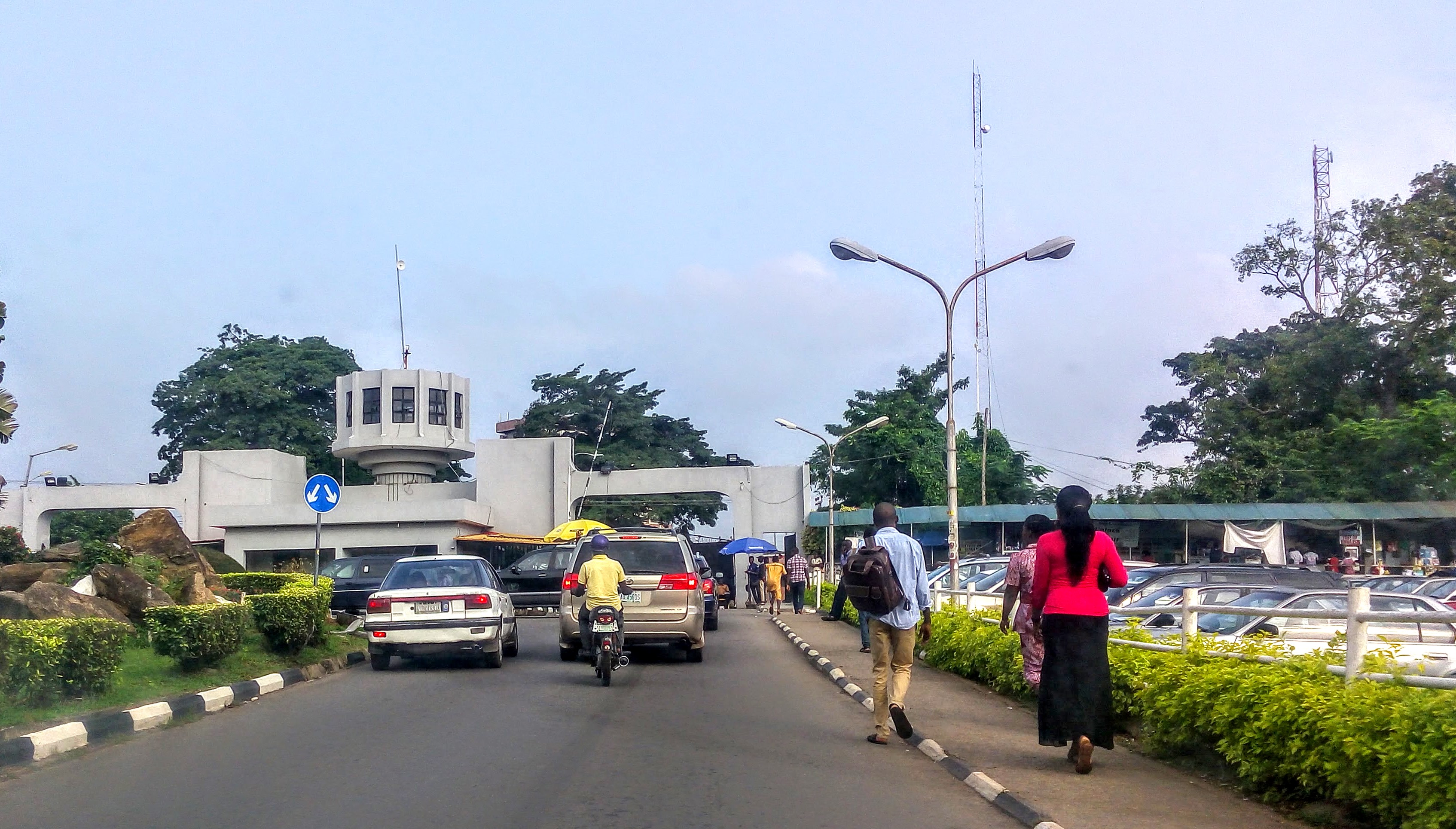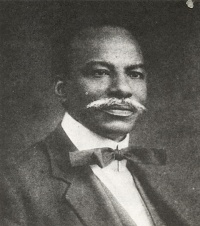|
Henry Rawlingson Carr
Henry Carr (15 August 1863 – 1945) was a Nigerian educator and administrator. He was one of the most prominent West Africans in the late nineteenth and early twentieth century and was a member of the legislative council in Lagos from 1918–1924. Background and education Henry Carr was born in the Colony of Lagos on 15 August 1863 to Amuwo Carr and Rebecca Carr, liberated Saro emigrants of Yoruba extraction. Amuwo Carr died in Abeokuta when Henry was seven years old, leaving Rebecca Carr in charge of young Henry's education. Henry attended Wesleyan School, Olowogbowo for his elementary education. He was sponsored by Reverend T.B. Thomas, a close friend of his mother, to attend Wesleyan High School in Freetown, British Sierra Leone for his secondary education. In Sierra Leone, he attended Fourah Bay College where he received an honours degree in 1880. He was the first graduate of the school to achieve the feat. He then went to England and signed up for courses at Lin ... [...More Info...] [...Related Items...] OR: [Wikipedia] [Google] [Baidu] |
Nigerian
Nigerians or the Nigerian people are citizens of Nigeria or people with ancestry from Nigeria. The name Nigeria was derived from the Niger River running through the country. This name was allegedly coined in the late 19th century by British journalist Flora Shaw, Lady Lugard, Flora Shaw, who later married Baron Frederick Lugard, 1st Baron Lugard, Frederick Lugard, a British colonial administrator. Nigeria is composed of various ethnic groups and Culture, cultures and the term Nigerian refers to a citizenship-based civic nationality. Nigerians are derived from over 250 ethno-linguistic groups.Toyin Falola. ''Culture and Customs of Nigeria''. Westport, Connecticut, USA: Greenwood Press, 2001. p. 4. Though there are multiple ethnic groups in Nigeria, economic factors result in significant mobility of Nigerians of multiple ethnic and religious backgrounds to reside in territories in Nigeria that are outside their ethnic or religious background, resulting in the mixing of the various ... [...More Info...] [...Related Items...] OR: [Wikipedia] [Google] [Baidu] |
Colonialism
Colonialism is the control of another territory, natural resources and people by a foreign group. Colonizers control the political and tribal power of the colonised territory. While frequently an Imperialism, imperialist project, colonialism can also take the form of settler colonialism, whereby settlers from one or multiple colonizing metropoles occupy a territory with the intention of partially or completely supplanting the existing population. Colonialism developed as a concept describing European colonial empires of the modern era, which spread globally from the 15th century to the mid-20th century, spanning 35% of Earth's land by 1800 and peaking at 84% by the beginning of World War I. European colonialism employed mercantilism and Chartered company, chartered companies, and established Coloniality of power, coloniality, which keeps the colonized socio-economically Other (philosophy), othered and Subaltern (postcolonialism), subaltern through modern biopolitics of Heterono ... [...More Info...] [...Related Items...] OR: [Wikipedia] [Google] [Baidu] |
King's College Lagos
King's College, Lagos (KCL) is a secondary school in Lagos, Lagos State, Nigeria. It was founded on 20 September 1909 with 10 students at Lagos Island, adjacent to Tafawa Balewa Square. The school admits only boys as pupils, although prior to the establishment of Queen's College Lagos it also admitted some female students. History In 1908, the Nigerian Acting Director of Education in Lagos, Henry Rawlingson Carr, proposed to Governor Walter Egerton a detailed scheme of education for Lagos. Carr's suggestions and proposals were the basis for the formation of King's College. Carr convinced the London Board of Education that King's College's education mission would not overlap but supplement the education initiatives of missionary societies. As a result, some authors regard Henry Carr as the "architect of King's College". King's School (as it was then called) came into being on 20 September 1909. The pioneer students included J.C. Vaughan, Isaac Ladipo Oluwole, Frank Macaulay, ... [...More Info...] [...Related Items...] OR: [Wikipedia] [Google] [Baidu] |
University Of Ibadan
The University of Ibadan (UI) is a public university located in Ibadan, Oyo State, Nigeria. Initially founded as the University College Ibadan in 1948, it maintained its affiliation with the University of London. In 1962, it became an independent institution, making it the oldest degree-awarding institution in Nigeria. The University of Ibadan has significantly contributed to Nigeria's political, industrial, economic, and cultural development through its extensive network of graduates. UI enrolls about 33,000 students. It is internationally recognized and has a number of accomplished alumni. History The university was established in 1948 as University College Ibadan, a branch of the University of London, which supervised its academic programs and awarded degrees until 1967. The establishment came as a result of a recommendation from the Asquith and the Elliot Commissions on Higher Education in the then-British colonies, that two Universities stemming from the University of ... [...More Info...] [...Related Items...] OR: [Wikipedia] [Google] [Baidu] |
Nigerian National Democratic Party
The Nigerian National Democratic Party (NNDP) was the first political party in Nigeria. The party was active in Lagos and was supported by the Lagos Daily Newspaper. History The NNDP was founded in on 24 June 1923 by Herbert Macaulay, the party's first leader. The party was created to take advantage of the new Clifford Constitution, which succeeded the 1914 Nigerian Council. The NNDP successfully organized various Lagos interest groups into a single group that was able to compete politically. The (NNDP) ran many candidates for seats in the 1922 elections for the Lagos Legislative Council, winning three seats. The party won all the seats in the elections of 1923, 1928 and 1933. Though, the party's major function was to put candidates into the legislative council, it had a broader objective of promoting democracy in Nigeria, increasing higher Nigerian participation in the social, economic and educational development of Nigeria. The party continued to dominate politics in Lago ... [...More Info...] [...Related Items...] OR: [Wikipedia] [Google] [Baidu] |
Herbert Macaulay
Olayinka Herbert Samuel Heelas Badmus Macaulay (14 November 1864 – 7 May 1946) was a Nigerian nationalist, politician, surveyor, engineer, architect, journalist, and musician. Macaulay is considered by many as founder of Nigerian nationalism. Early years Herbert Macaulay was born on 14 November 1864 on Broad Street, Lagos, to the family of Thomas Babington Macaulay and Abigail Crowther. His parents were children of people captured from what is now Nigeria, resettled in Sierra Leone by the British West Africa Squadron, and eventual returnees to present day Nigeria. Thomas Babington Macaulay was one of the sons of Ojo Oriare while Abigail Crowther was the daughter of Bishop Samuel Ajayi Crowther, a descendant of King Abiodun. Thomas Babington Macaulay was the founder of the first secondary school in Nigeria, the CMS Grammar School, Lagos. Education Macaulay started primary school in 1869 and from 1877, he was educated at St Paul's Breadfruit School, Lagos ... [...More Info...] [...Related Items...] OR: [Wikipedia] [Google] [Baidu] |
Higher College, Yaba
Yaba Higher College was founded in 1932 in Yaba, now a suburb of Lagos in Nigeria to provide tertiary education to Africans, mostly in vocational subjects and teaching. The college staff were transferred to start the University College, Ibadan in 1948 and the college premises were used for the new Yaba College of Technology. Foundation Yaba Higher College the brainchild of E. R. J. Hussey, who became Director of Education in Nigeria in 1929. Soon after arriving, he proposed a higher college at Yaba similar to the Makerere College in Uganda, his previous posting. The goal was at first to train assistants for government departments and private firms, with a gradual increase in standards until eventually the college would reach the level of a British university. Hussey gained acceptance of the plan, starting with a "special medical school at King's College". By 1932 the school had its own building - a temporary hut - and other courses were added. The college at Yaba was an all- ... [...More Info...] [...Related Items...] OR: [Wikipedia] [Google] [Baidu] |
Ghana
Ghana, officially the Republic of Ghana, is a country in West Africa. It is situated along the Gulf of Guinea and the Atlantic Ocean to the south, and shares borders with Côte d’Ivoire to the west, Burkina Faso to the north, and Togo to the east. Ghana covers an area of , spanning diverse ecologies, from coastal savannas to tropical rainforests. With nearly 35 million inhabitants, Ghana is the second-most populous country in West Africa. The capital and largest city is Accra; other significant cities include Tema, Kumasi, Sunyani, Ho, Cape Coast, Techiman, Tamale, and Sekondi-Takoradi. The earliest kingdoms to emerge in Ghana were Bonoman in the south and the Kingdom of Dagbon in the north, with Bonoman existing in the area during the 11th century. The Asante Empire and other Akan kingdoms in the south emerged over the centuries. Beginning in the 15th century, the Portuguese Empire, followed by other European powers, contested the area for trading r ... [...More Info...] [...Related Items...] OR: [Wikipedia] [Google] [Baidu] |
Country
A country is a distinct part of the world, such as a state, nation, or other political entity. When referring to a specific polity, the term "country" may refer to a sovereign state, state with limited recognition, constituent country, or dependent territory. Most sovereign states, but not all countries, are members of the United Nations. There is no universal agreement on the number of "countries" in the world, since several states have disputed sovereignty status or limited recognition, and a number of non-sovereign entities are commonly considered countries. The definition and usage of the word "country" are flexible and have changed over time. '' The Economist'' wrote in 2010 that "any attempt to find a clear definition of a country soon runs into a thicket of exceptions and anomalies." Areas much smaller than a political entity may be referred to as a "country", such as the West Country in England, "big sky country" (used in various contexts of the American We ... [...More Info...] [...Related Items...] OR: [Wikipedia] [Google] [Baidu] |
Expatriates
An expatriate (often shortened to expat) is a person who resides outside their native country. The term often refers to a professional, skilled worker, or student from an affluent country. However, it may also refer to retirees, artists and other individuals who have chosen to live outside their native country. The International Organization for Migration of the United Nations defines the term as 'a person who voluntarily renounces his or her nationality'. Historically, it also referred to exiles. The UAE is the country with the highest percentage of expatriates in the world after the Vatican City, with expatriates in the United Arab Emirates representing 88% of the population. Etymology The word ''expatriate'' comes from the Latin words and , from , . Semantics Dictionary definitions for the current meaning of the word include: :Expatriate: :* 'A person who lives outside their native country' (Oxford), or :* 'living in a foreign land' (Webster's). These definitio ... [...More Info...] [...Related Items...] OR: [Wikipedia] [Google] [Baidu] |
European Ethnic Groups
Europeans are the focus of European ethnology, the field of anthropology related to the various ethnic groups that reside in the states of Europe. Groups may be defined by common ancestry, language, faith, historical continuity, etc. There are no universally accepted and precise definitions of the terms "ethnic group" and "nationality", but in the context of European ethnography in particular, the terms ''ethnic group'', ''people'', ''nationality'' and ''ethno-linguistic group'' are used as mostly synonymous. Preference may vary in usage with respect to the situation specific to the individual countries of Europe, and the context in which they may be classified by those terms. The total number of national minority populations in Europe is estimated at 105 million people, or 14% of 770 million Europeans in 2002.Christoph Pan, Beate Sibylle Pfeil (2002), Minderheitenrechte in Europa. Handbuch der europäischen Volksgruppen', Braumüller, (Google Books, snippet view). Als2006 rep ... [...More Info...] [...Related Items...] OR: [Wikipedia] [Google] [Baidu] |




